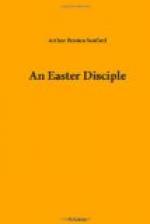One purchase only does Quintus make. In a shop where Egyptian wares are sold he says to Aulus:
“Look on this scarab, this sacred beetle, which has been shaped by some workman down in Thebae on the Nile. We may be sure that no people believes more intensely in a future life. What compliment they pay this physical frame of men when they hold that embalmment restores to the soul its former body! After the judgment of Osiris, if their lives be true, the worthy shall enjoy the companionship of the great god forever. No other people wears such a visible emblem of their faith in another life. I will buy this scarab for an amulet against accident and evil.”
But where had the workman gone who once had shaped that token of immortality? Whither had vanished his carver’s skill? Where had disappeared his projects and his dreams? Quintus is not thinking of any proconsulship he may win, or even of the love light in the eyes of Lucretia, as he climbs again the heights of Scopus. Rather he is meditating on the departed maker of scarabs—and on the destiny of the soul. For ages the philosophers have been speculating about the future life. Familiar is Quintus with the views of Laelius and Seneca, among the Roman inquirers, and with the teachings of the great Grecians who have spoken in classic Athens. But now the question leaps to the front. Quintus is in the city where Ayran travelers and Persian magi and Egyptian priests are busy telling their theories of immortality. He is in the very streets, besides, where a sandaled Teacher from Nazareth is declaring that the dead shall live again. If but half is true that this strange Man is reputed to have said, no priest of Jupiter has ever uttered at Rome so luminous a word. Can it be that Quintus himself shall see this Christus and hear his message? If so, his will be in very truth a momentous quest.
II
IN SOLOMON’S PORCH
“Give me new consolation, great and strong, of which I nave never heard or read.”—Pliny.
With increasing frequency Christ was now speaking his prophecies of the life immortal. In his earlier ministry he had been dwelling upon the presence of the divine kingdom in the earth, the practical conditions for membership therein, and the inclusion of Gentile as well as Jew in the gracious provision. Novel were his words. Whoever had heard his discourse on the Mount or the parable of the lost sheep was rich beyond the modern sons of men. But now, in the closing period of his stay with mortals, he was more frequently foretelling the life to come. Like a footworn traveler drawing near the homeland, he was keenly anticipating his return to the spirit world. Those who listened to him heard majestic intimations of a celestial country which eye had not beheld. Nor is it to be thought that the Gospels, in their restricted pages, have recorded half his words concerning the heavenly land.




